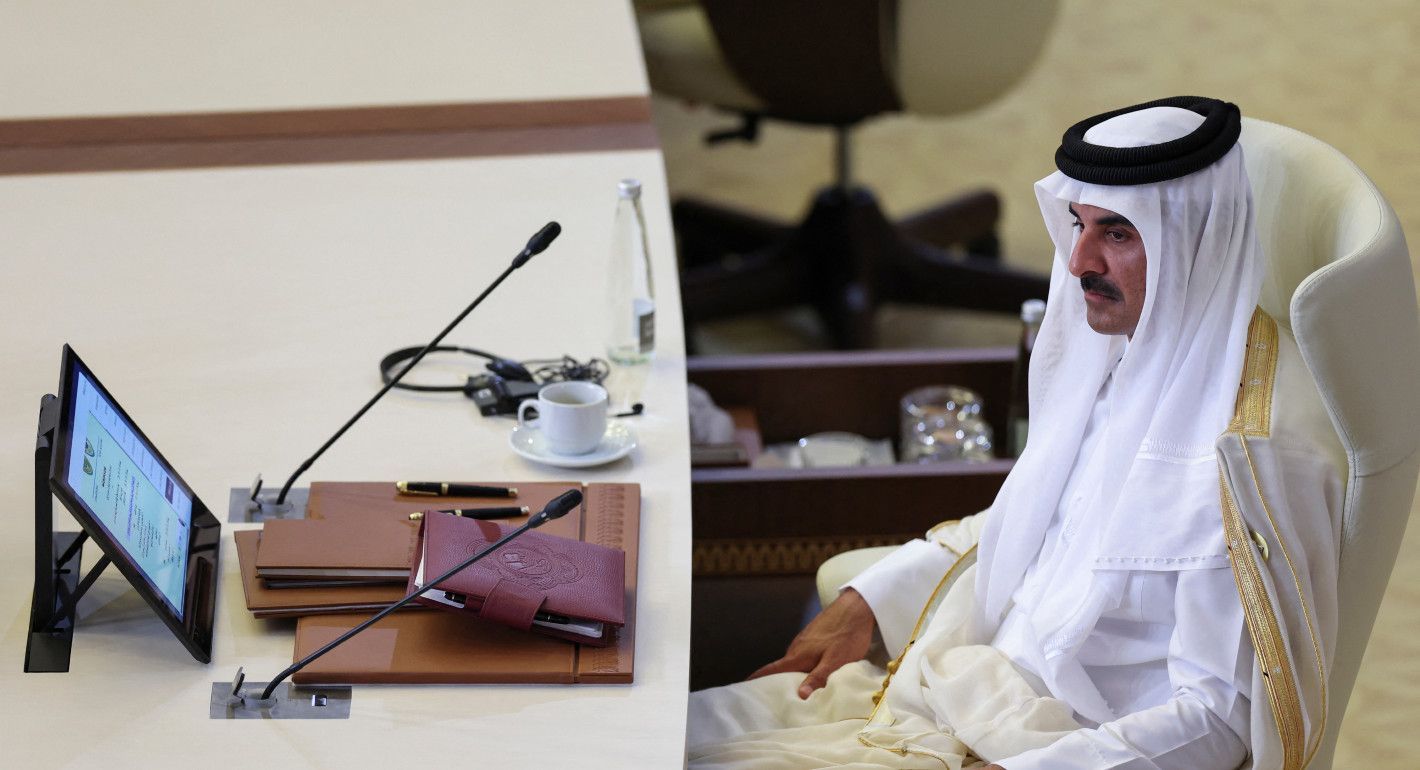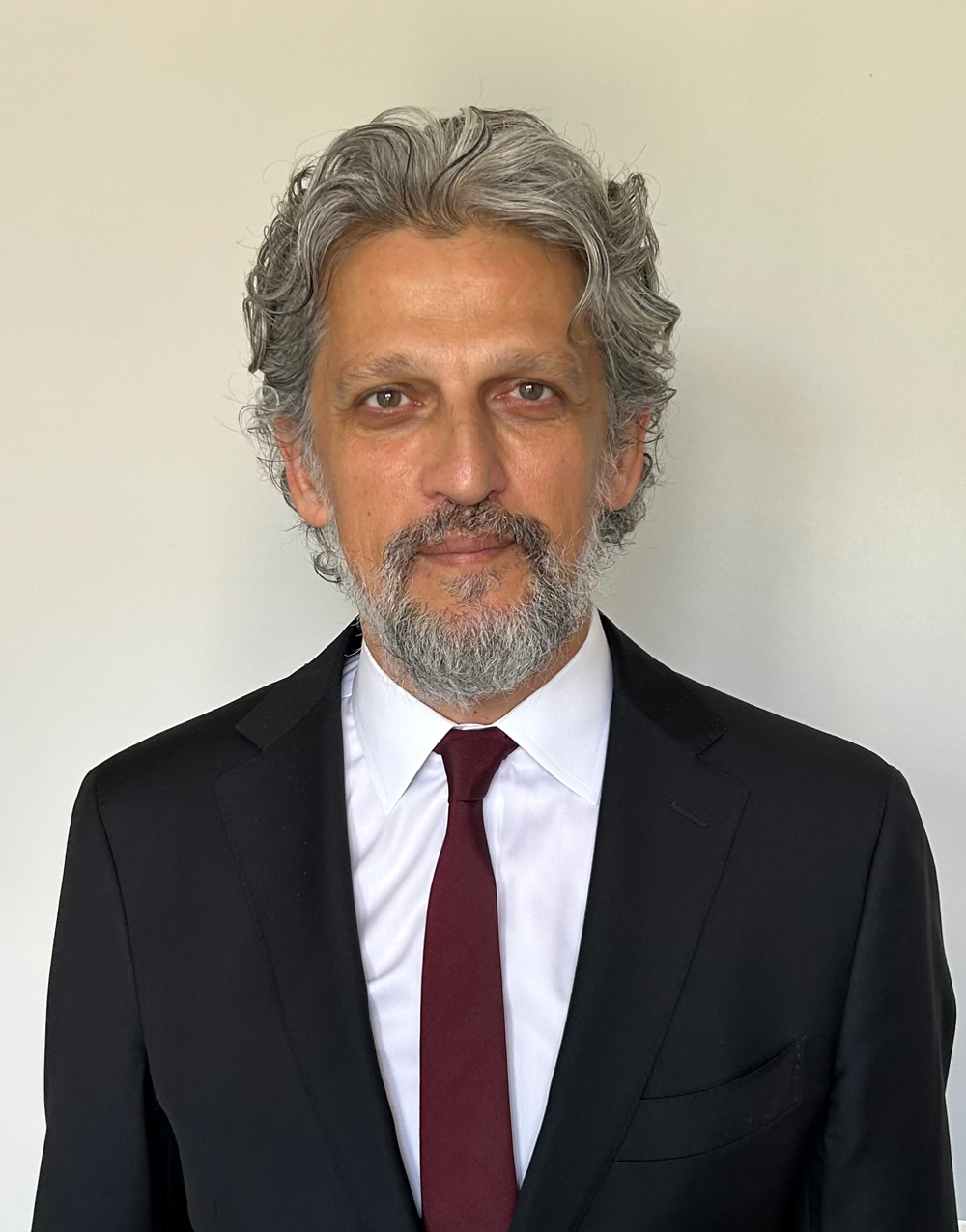It’s dangerous to dismiss Washington’s shambolic diplomacy out of hand.
Eric Ciaramella
{
"authors": [
"Andrew Leber"
],
"type": "commentary",
"blog": "Emissary",
"centerAffiliationAll": "dc",
"centers": [
"Carnegie Endowment for International Peace"
],
"englishNewsletterAll": "menaTransitions",
"nonEnglishNewsletterAll": "",
"primaryCenter": "Carnegie Endowment for International Peace",
"programAffiliation": "MEP",
"programs": [
"Middle East"
],
"projects": [],
"regions": [
"Middle East",
"Saudi Arabia",
"Iran",
"Qatar",
"Israel"
],
"topics": [
"Foreign Policy",
"Security"
]
}
Qatari Emir Tamim at the Arab League summit in Baghdad in May 17(Photo by Thaier Al-Sudani/pool/AFP via Getty Images)
Despite newfound support for diplomatic solutions, the monarchies collectively appear unable or unwilling to do more than keep a door open to Tehran in the event of future talks.
The past few weeks have been busy for diplomats of the Gulf Cooperation Council (GCC) monarchies, which have successively criticized Israel’s airstrikes on Iran, expressed concern over U.S. strikes on Iranian nuclear facilities, and condemned Iran’s missile strike on a Qatari military base that hosts U.S. forces.
Amid this flurry of activity, a throughline among Gulf-state responses has been a desire to keep clear of an Israeli-Iranian conflict that stands to define regional geopolitics for the near future. However, even as Israel now rivals Iran as a source of regional instability in the eyes of many GCC officials, different states are taking different approaches to manage the resulting sense of anxiety.
Qatari Emir Tamim bin Hamad al-Thani, for example, has sought refuge in the eye of the storm, attempting to maintain good ties with all sides through active diplomatic engagement. This continues both the country’s longstanding efforts to be a broker between the United States and a revolving cast of regional actors, and its more specific balancing act in U.S.-Israel-Hamas negotiations over a potential ceasefire.
Qatari leaders surely were not thrilled by Iran choosing to signal resolve by launching missiles at the Al Udeid base—the Ministry of Foreign Affairs warned of “catastrophic consequences” for the region if escalation continued. Advance warning from Iran—resulting in no casualties on the ground—was likely little comfort to the country’s residents and citizens who watched the inbound missiles being shot down overhead. One former Qatari diplomat called the attack “a blatant assault on Qatari sovereignty” in an op-ed intended for domestic consumption.
Still, within hours of the attack, Emir Tamim received direct praise from U.S. President Donald Trump for “seeking Peace for the Region.” Qatari diplomats ensured that their country’s role in mediating a U.S.-Iran-Israel ceasefire was widely reported in leading U.S. outlets, in the process demonstrating Qatari officials’ direct access to the president and vice president amid the crisis. This kind of good press ensures that Qatar’s regional value outweighs any domestic U.S. criticism of Qatar-Hamas ties in Trump’s thinking. Yet Qatar lacks the economic or security leverage to do more than look after its own security and sovereignty while serving as a go-between for regional conflict actors.
Saudi Arabia clearly has at least some leverage with the United States, having used a marquee investment conference to facilitate a significant shift in U.S. policy toward Syria’s new government. Yet while Saudi diplomats struck many of the same notes as their Qatari counterparts on recent hostilities, they did so against a backdrop of efforts to disengage from—rather than resolve—the region’s more intractable conflicts.
Policy discussions in Washington about Riyadh’s regional positioning tend to frame things in binaries: whether it still plans to normalize ties with Israel, or whether it is willing to put new political capital behind longstanding but nominal support for a two-state solution. Yet Saudi actions over the past few weeks—reflected in domestic narratives—instead outline a “third way” approach, one that seeks to insulate its economy from conflict-related disruptions and Crown Prince Mohammad bin Salman (MBS) from any association with Israeli war crimes in Gaza.
Already, Saudi Arabia’s approach to matter of Palestine has settled into a careful balancing act, one that combines strong rhetoric from MBS accusing Israel of “collective genocide” in Gaza with an absence of actions that might prompt genuine conflict with U.S. or even Israeli leaders. For his part, Trump has put no overt pressure on Saudi Arabia to normalize ties with Israel, in contrast to the clear expectation that Syria’s new leadership make an earnest effort to engage with Israel. So although Saudi officials have privately signaled that they remain serious about pursuing a two-state solution, they were probably relieved that the Iran-Israel war provided a ready excuse to indefinitely delay a joint UN conference with France on Palestinian statehood—one that threatened a more direct confrontation with the Trump administration.
This sentiment reflects Riyadh’s efforts to pursue a new incarnation of a “zero problems with neighbors” policy—maintaining cordial ties around the region while focusing on economic ventures at home. Even if online Saudi nationalists have not forgotten the kingdom’s yearslong diplomatic dispute with Qatar, Saudi officials see it as water under the bridge as they cooperate with Qatar on propping up Syria’s economy and court Qatari investments in the Saudi economy.
This extends to Iran as well, with a Saudi-Iranian diplomatic rapprochement from early 2023 proving resilient amid the fallout from October 7 and Israel’s subsequent response. However, domestic Saudi narratives suggest this will remain a “cold peace”—Saudi leaders’ distancing themselves from Israel does not mean a full embrace of Iran. Abdulghani al-Kindi, an academic writing for the Saudi-owned regional newspaper Asharq al-Aawsat, contended that the Israel-Iran conflict had laid bare Iran’s military weakness, suggesting that past fears of Iranian influence had been overblown. Another regular writer, even while criticizing Israel’s airstrikes, conceded that that “no one . . . is prepared to intervene on Iran’s behalf.”
In contrast to Qatar, Saudi Arabia’s approach to navigating the present turmoil stresses an effort to avoid getting caught up in Israeli-Palestinian and Israeli-Iranian conflicts as much as possible. Columnist and broadcaster Meshari al-Thaydi best summed up this “unaligned” worldview in denouncing Iran’s attack on Al Udeid: “The people of the Gulf have no business in the ongoing ‘battle’ between Tehran, Washington, and Tel Aviv except in striving—in good faith—to extinguish the flames of war without compromising Gulf security.”
In recent days, comments from around the GCC—including from writers based in the UAE, Bahrain, and Oman—have warned against the further use of force to achieve political aims in Iran. Yet despite newfound support for diplomatic solutions to conflicts within Iran even in Riyadh, the monarchies collectively appear unable or unwilling to do more than keep a door open to Iran in the event of future talks with the United States and offer economic incentives for peace in the event of a diplomatic agreement.
The latest from Carnegie scholars on the world’s most pressing challenges, delivered to your inbox.
Carnegie does not take institutional positions on public policy issues; the views represented herein are those of the author(s) and do not necessarily reflect the views of Carnegie, its staff, or its trustees.
It’s dangerous to dismiss Washington’s shambolic diplomacy out of hand.

Eric Ciaramella
Washington and New Delhi should be proud of their putative deal. But international politics isn’t the domain of unicorns and leprechauns, and collateral damage can’t simply be wished away.

Evan A. Feigenbaum
The uprisings showed that foreign military intervention rarely produced democratic breakthroughs.


Amr Hamzawy, Sarah Yerkes
An Armenia-Azerbaijan settlement may be the only realistic test case for making glossy promises a reality.

Garo Paylan
Venezuelans deserve to participate in collective decisionmaking and determine their own futures.

Jennifer McCoy